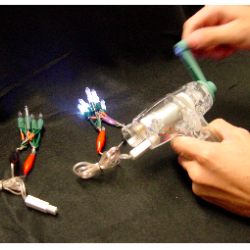Source Institutions
Source Institutions
Add to list Go to activity
Activity link broken? See if it's at the internet archive

In this activity, learners actually feel the difference in energy required to light two different types of light bulbs: incandescent light and LEDs. Learners will use a generator (hand crank) to provide the power and observe that the bulbs are equally bright. They will be surprised to learn that incandescent bulbs require more energy. This is a hands-on activity that works best if learners experience cranking the generator themselves, and works well at a learning station or center. This activity can be incorporated into a lesson on energy efficiency and/or used during winter holidays since it uses holiday lights.
- Under 5 minutes
- 5 to 10 minutes
- $5 - $10 per group of students
- Ages 8 - 14
- Activity, Lesson/Lesson Plan
- English
Quick Guide
Materials List (per group of students)
- 1 hand generator
- 2 alligator clip leads, 1 black and 1 red
- 1 cluster of 6 white LED Christmas tree lights
- 1 cluster of 6 clear incandescent Christmas tree lights
- Infrared goggles (optional)
Subjects
-
Engineering and Technology
- Technology
-
Physical Sciences
- Electricity and Magnetism
- Energy
-
Vibration and Waves
- Light and Optics
-
Light and Optics
- Electromagnetic Spectrum
-
The Nature of Science
-
The Scientific Process
- Conducting Investigations
- Formulating Explanations
-
The Scientific Process
-
The Nature of Technology
- Technology and Society
Audience
To use this activity, learners need to:
- see
- touch
Learning styles supported:
- Involves hands-on or lab activities
Other
Components that are part of this resource:
This resource is part of:
Access Rights:
- Free access
By:
Rights:
- All rights reserved, Little Shop of Physics, 2009
